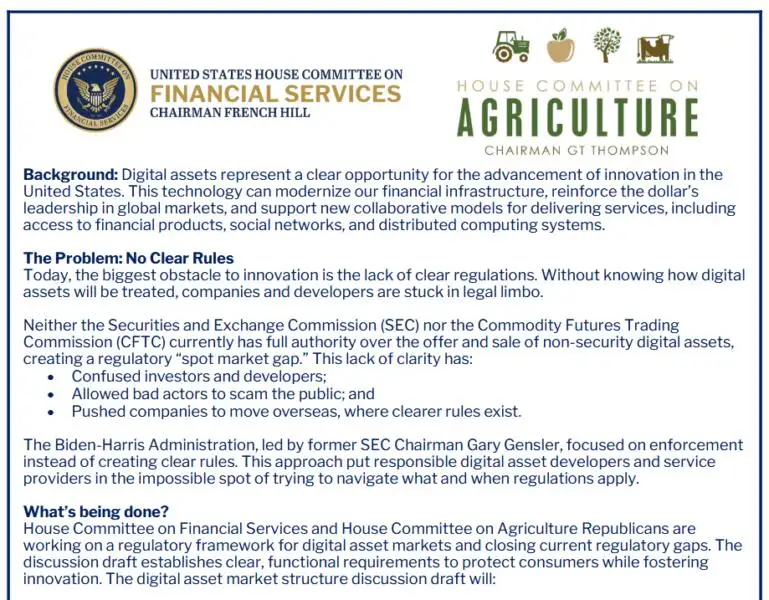New crypto bill draft seen to curb big crypto firm influence

The new “Digital Asset Market Structure Discussion Draft” introduced by House Republicans on May 5 could work to reduce the dominance of large crypto firms and promote more participation in the broader market, according to an executive from Paradigm. The discussion draft, led by the House agricultural and financial services committee chairs Glenn Thompson and French Hill, is an “incremental, albeit meaningful, rewrite” of the Financial Innovation and Technology for the 21st Century Act (FIT21), Paradigm’s vice president of regulatory affairs Justin Slaughter said in a May 5 X post.One of the major changes from FIT21 is that the draft defines an affiliated person as anyone who owns more than 1% of a digital commodity issued by the project — down from 5% in the FIT21 bill — a move Slaughter said may curb the influence of big crypto firms and lead to more participation in the crypto market.“This is a portent of the entire bill. There are often criticisms of crypto being too dominated by a few large firms. This bill makes clear the regulatory regime proposed is going to push against that fact and strongly encourage more small-d ‘democratization’ of the space.”The draft also defines a “mature blockchain system” as one that, together with its related digital commodity, is not under the “common control” of any person or group.The Securities and Exchange Commission would be the main authority regulating activity on crypto networks until they become sufficiently decentralized, Slaughter noted.The draft also clarified that decentralized finance trading protocols are those that enable users to engage in a financial transaction in a “self-directed manner.” Protocols that meet this criterion are exempt from registering as digital commodity brokers or dealers.The draft also referred to digital commodities as “investment contract assets” to distinguish their treatment from stocks and other traditional assets under the Howey test.According to Slaughter’s analysis, securities laws won’t be triggered unless the secondary sale of tokens also transfers ownership or profit in the underlying business.Crypto firms would also have a path to raise funds under the SEC’s oversight while also having a “clear process” to register their digital commodities with the Commodity Futures Trading Commission, the committee members said in a separate May 5 statement.Joint rulemaking, procedures, or guidelines related to crypto asset delisting must be established by the CFTC and SEC should a registered asset no longer comply with rules laid out by the regulators.A “clear opportunity” to advance crypto innovation, rules once and for allSpeaking about the need for a comprehensive crypto regulatory framework, the House committee members said crypto is a “clear opportunity” to advance innovation in the US — most notably through modernizing America’s financial infrastructure and reinforcing US dollar dominance.The Republicans criticized the previous Biden administration and the Gary Gensler-led SEC for adopting a regulation-by-enforcement strategy rather than creating clear rules for market participants.Many crypto firms were stuck in “legal limbo” as a result of the unclear rules, which pushed some industry players overseas, where clearer rules exist, the House committee members said.“America needs to be the powerhouse for digital asset investment and innovation. For that to happen, we need a commonsense regulatory regime,” said Dusty Johnson, chairman of the subcommittee on commodity markets, digital assets and rural development.Slaughter added: “This is the bill that will, finally, provide a clear regulatory regime on crypto that many have been calling for.”Republicans already facing roadblocks over discussion draftHouse Financial Services Committee Ranking Member Maxine Waters plans to block a Republican-led event discussing digital assets on May 6, a Democratic staffer told Cointelegraph.The hearing, “American Innovation and the Future of Digital Assets,” is expected to discuss the new crypto markets draft discussion paper pitched by Thompson, Hill, and other committee members.However, according to the unnamed Democratic staffer, the current rules require all members of the House Financial Services Committee to agree on such hearings.